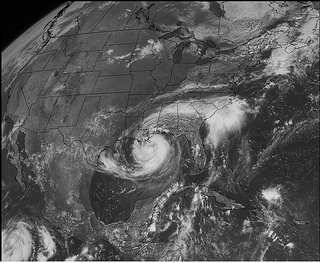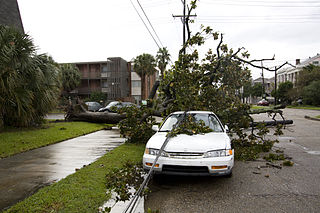Hurricane Isaac Scenes: Looting Remains Underreported In Parishes, And Tulane Students Lose Sleep And Windows

Though Hurricane Isaac was reported to be a lighter storm than Hurricane Katrina, the recent hurricane damaged a wider range of cities and states than the 2005 one did.
Hammond:
In Hammond, La., less than 50 miles from New Orleans, in Tangipahoa Parish, the effects of Hurricane Isaac have been harsh, and remain so into Thursday, when many people are hoping for a way to come back from losing everything.
Karen Barr, a mother of three and a Hammond local, said over the phone that much of what has happened in their town and towns like theirs has not been reported or mentioned in the news.
"They said it was a Category One, but we know what we were hit with with the winds," Barr said.
She and her husband decided to stay in their home after the storm, which hit their house with 70-80 mph winds, but they sent their 15-year-old daughter to stay with their oldest child, who lives in Maryland in a house with a generator.
At the Maryland house, the Barrs' oldest daughter saw the two acres of land surrounding her home get flooded, the water destroying much of her bottom floor.
Only a few people in Hammond decided to stay in town and wait out the storm.
Mr. and Mrs. Barr decided to stay home because they knew if they left, their whole house would be ransacked by looters.
"I was about ready to give up. I told my husband, 'Just put a note on the door [that says], 'If you're going to take something, take everything. Don't trash my place, just take it all,'" she said.
Barr said that looters tend to take every item from homes, including family pictures, things that can't be replaced.
They personally know a lot of people who were victims of looting in their parish.
She was aware of a single mother the same age as her 21-year-old son who had all the photos of her newborn child stolen from her home.
Their next-door neighbor had to pull a gun on someone, and the Barrs keep all their windows closed at night, despite the overwhelming humidity.
She said that people ride around the neighborhood in trucks, moving slowly to see if any houses are good to plunder.
Barr said that she's hoping that the Federal Emergency Management Agency (FEMA) will declare Tangipahoa Parish a disaster area, which would bring more aid to the people in her neighborhood who "have lost every single thing," she said.
Many of the Barrs' friends' homes have water almost up to their roofs.
The Barrs had moved to Hammond originally because they knew the area had underground power and no trees, and would therefore be sturdier during a disaster.
She said that because the storm did not hit the levees that were broken during Hurricane Katrina and re-fortified, the areas that were more devastated from Isaac were less prepared.
According to CNN, at least 13,000 homes were damaged in Louisiana.
Because Hammond is miles away from the gulf, the Barrs were more worried that the several nearby rivers would flood.
On Saturday, they got their power back, but as late as last Thursday or Friday, when they decided to hit the newly opened roads, Mrs. Barr said that she couldn't open her car door without having water rush inside.
They couldn't drive down one side of their street, so maintaining any kind of normalcy is a work in progress.
Her husband, who works as a boilermaker, went back to work earlier this week, but was unable to actually perform any task because of the area's damage.
"And the smell," Mrs. Barr said. "There's nothing like the smell of the storm afterwards. It's just a stench."
Tulane:

With what he estimates to be about half of Tulane University evacuated to Texas and Baton Rouge (or anywhere they could get), Elliott Ward-Bowen, 21, a senior, went to the grocery store on Monday, Aug. 27, to stock up for what he expected to be a weakling of a storm.
After hearing that a lot of the grocery stores had sold out of bottled water, he instead bought one box of Chips Ahoy cookies, a big bag of Ruffles chips and two bottles of vodka.
"I would have bought something different though if I had known how long the power was going to be out after [the storm]," he said. "Surviving off cookies and chips gets old fast."
Later on, once the power and Internet went out, and after his cell phone died, Ward-Bowen's parents, who live in California, worried that something bad had happened.
Unable to sleep, sipping a still-cold vodka/Red Bull, he watched his window shake and thought it would shatter.
In the morning, after dozing off, he could see a little bit with help from faint light coming through the storm clouds, and could tell that all his posters had been warped, his guitar strings had a thick green layer on them from the humidity and one of his windows had been knocked out.
"So here come ants, mosquitos, flies and, most importantly, rain," he said.
He didn't leave his room for two more days.
In these two days alone, he got through a full bottle of the vodka. "I'm ashamed and proud of it," he said.
To pass the time, he "even resorted" to making snowflakes out of paper.
His resident advisor came to check on him on the third day, but his door had swollen shut.
Once the power came back on, Ward-Bowen found out the hard way that Thursday and Friday classes had been cancelled.
His cell phone wasn't getting service after he could finally charge it, so he started out into the rain, walking sideways.
"Guess who looked like an idiot?" he said.
Unlike Hammond, which had no trees, the Tulane campus in Uptown New Orleans was covered with broken trees and plant debris.
Ward-Bowen, speaking over Facebook since he'd caught a flu from the post-Isaac atmosphere, saw a house with a tree that had fallen through its roof.
"Even when I've been walking to parties this weekend, trees, leaves, everywhere," Ward-Bowen said.
Because the Tulane campus is on higher ground, it has not seen significant damage from flooding in the past two major Louisiana hurricanes, according to India Jacobs, a junior.
Jacobs also spent the storm on campus, sleeping in the hallway of her dorm, listening through the door to see if her room's windows would shatter.
She was unable to sleep, but said the "funniest" part of Isaac was having to deal with food.
The university provided students with food rations, but because Jacobs is a vegetarian, she had to subsist on crackers and peanut butter cups for almost two days.
A lot of the rooms in her dorm were flooded.
But on the whole, Jacobs said Hurricane Isaac wasn't terrible.
All comparisons between Katrina and Isaac are forced, she said, because everyone had known that Katrina was going to be terrible, and it turned out to be even more terrible than expected.
"Isaac was so unpredictable and it didn't really look like it was going to be that strong, and it turned out not being that strong," Jacobs said.
Looting was not a major concern, it seemed. The city of New Orleans issued a curfew for a couple days after the storm, which Jacobs said could have been a preventative measure against looting or because the traffic lights were out.
Classes at Tulane started again on Sept. 4.
Read more of Neon Tommy's coverage of Hurricane Isaac here.
Reach Assistant News Editor Michael Juliani here; follow him on Twitter here.



